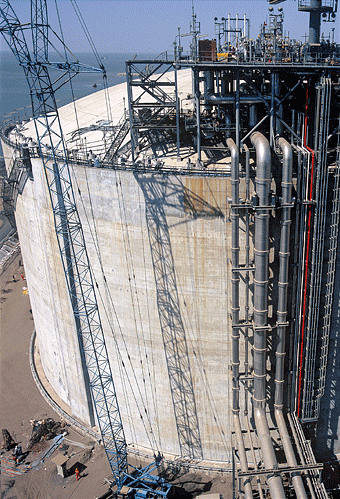- About Us
- Energy
- Infrastructure
- Defence
- Media Room
- Careers
- Corporate Responsibility
- Investors
- Landmark Projects Gallery
- About Us

Health, Safety, Environment and Quality
As an OHSAS 18001, ISO 14001 and ISO 9001 certified company, we adopt the world’s best practices of Health, Safety, Environment and Quality (HSEQ). Our certifications have been received after a detailed assessment of our Quality Management Systems (QMS), Environment Management Systems (EMS) and Health & Safety Management Systems (OHSAS) by DNV-GL Business Assurance India Ltd.
At all our sites the world over, we conscientiously maintain a healthy, safe, sustainable and pollution-free work environment of the highest standards. As a global citizen, we have integrated the performance standards of the International Finance Corporation (IFC) into our HSEQ management system. This helps us to avoid, reduce, mitigate or compensate for the impact on people and the environment and to improve conditions where appropriate. Our efforts in HSEQ and this humanitarian sphere are widely acknowledged by clients, government agencies, non-governmental organisations (NGOs), industry and business authorities.
Safety is an absolute. It is the unconditional, non-negotiable part of our business. Every life is precious, the safety of our employees, customers and the public is paramount. Every person is committed to ensuring a hazard-free and safe working environment, going beyond mere compliance of safety rules to building a definitive safety culture. This involves a rigorous implementation of Health, Safety, Environment and Quality (HSEQ) measures, achieved through leadership engagement, early programme involvement, design, technology selection, risk mitigation and work performance. Besides keeping people safe, our commitment to incident-free operations, ultimately contributes to improved operations, reliability, lower costs, and higher productivity.
Safety is instilled into our employees from Day 1. Before new employees even start on any assignment, they are taken through safety orientation programmes, highlighting hazard identification techniques and emergency procedures. Risk assessment and job safety analysis are mandatory at every site, followed by control measures taken before work commences. Continuous health and safety surveillance is reinforced with safety audits carried out at regular intervals. Regular training that includes safety alerts, mock drills and handling near-miss incidents, is carried out to update knowledge, reinforce familiarity and reduce response time. Monthly safety awards are awarded for best safety practices to motivate to incident-free operations, ultimately contributes to improved operations, reliability, lower costs, and higher productivity.
HSEQ promotion activities are high on our agenda, including the celebration of National Safety Day, AIDS Awareness Day and Environment Day at all sites. One of the most vital ways of improving safety is by minimising risk levels and human error. We achieve this by our regular adoption of innovative methods and the latest technology, as in our use of automatic welding to eliminate our workers’ exposure to toxic smoke, radiation and high heat.
We stand committed to protecting the environment by minimising pollution, optimising fuel consumption, and converting waste into resources where we can.
Working in diverse regions and in different communities and terrain, Punj Lloyd has always maintained focus on sustainable development practices. Sustainable development for us stands for the balance between fulfilment of human needs with the protection of the natural environment so that these needs are met in the indefinite future as well. This is evident in most of our project sites where utmost care is taken to conserve the environment.
Before construction of Baku Tbilisi Ceyhan pipeline, Punj Lloyd Limak - JV conducted a detailed vegetation mapping along the pipeline Right Of Way (ROW) and identified the threatened and rare species found in the area. The surveys were followed with documentation, compilation of environmental manuals, setting up of procedures, formulation of plans, establishing of special area reinstatement methods, preparation of reports and mobilisation of resources. During the construction phase, important areas were barricaded, erosion was controlled, ROW and rivers were protected and environmental training was imparted to all concerned. In the post construction phase, reinstatement and bio restoration were the most important activities carried out.
Our special achievements at this site were successful reinstatement of the Zamanti River and innovative waste management activities carried out. The Zamanti River and its floodplain is home to fish, eel, aquatic and exotic plants and migratory birds. Between the periods of their migration, breeding and ecological constraints, we had only two months in the entire year to execute this important river crossing. Care was taken to preserve the top soil from the ROW and during mobilisation of equipment, reinstatement of river and its tributaries, re-contouring the land with re-growth of flora.
In Tunu Field Development project in Indonesia, effective monitoring and implementation of Environment Management Plan during construction in the restricted ROW saved the adjoining aqua culture ponds, fishnets, vegetation, flora and fauna in the Mahakam Delta. Continuous analysis of seawater to maintain its natural quality was undertaken. This activity also ensured there was no negative impact on fishing and shrimp farming, which are important economic activities of the Mahakam Delta.
Practices such as usage of biodegradable sandbags instead of plastic sandbags in swamp have saved the environment besides minimising the cost of manpower and equipment deployed for retrieval of plastic bags.
These small practices demonstrate our concern and commitment to protecting the environment.
Quality initiatives play a critical role in differentiating the Company in a highly competitive market place. Punj Lloyd acknowledges that effort on quality management is a continuous process and is firmly committed to deploying effective systems and processes across all its functions and project sites.
System effectiveness is improved mainly by identification of process wise risk and opportunities, and the implementation of the mitigation action plan. This underlines effective implementation and control of the integrated management system procedures.


CONTACT US
Group Headquarters
78 Institutional Area
Sector 32
Gurgaon 122 001, India
- Tel : +91 124 262 0123
- Fax : +91 124 262 0111
- Email : info@punjlloyd.com
To submit your resume for potential vacancies, click here




